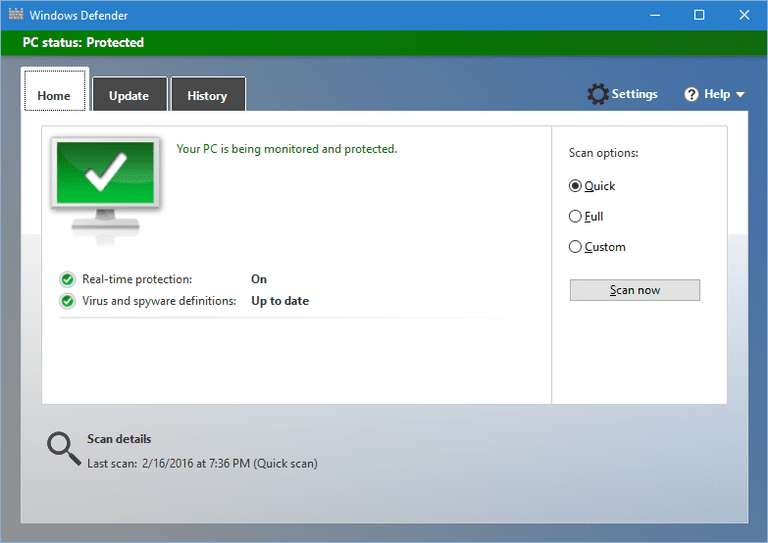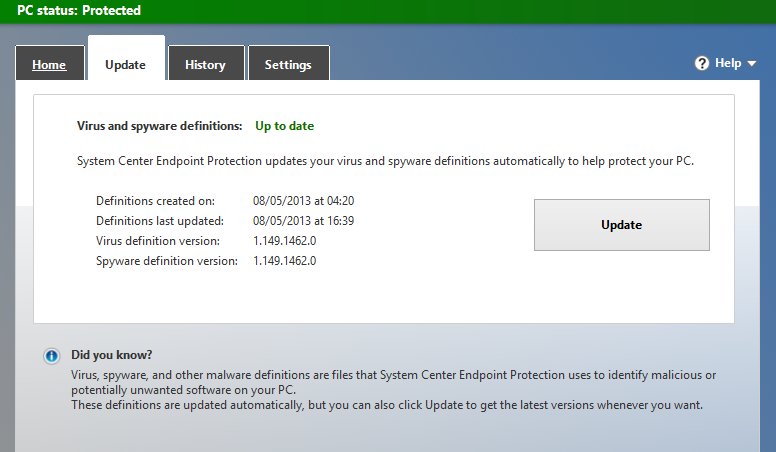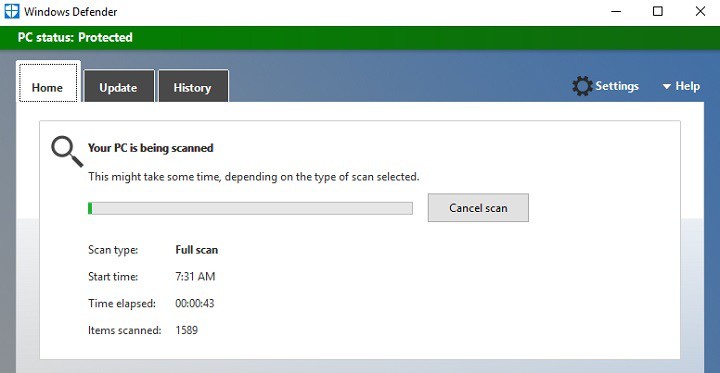The hassle of getting an anti-virus installed your computer can be confusing and time-consuming territory. But Microsoft users don’t have to bother with this problem as a trustworthy antivirus comes installed in their system. It is named Windows Defender.
Microsoft Windows Antivirus Introduction
Over the years, free and sincere services provided by Windows Defender have served a large community of Microsoft users. The antivirus program was first released as a free of cost antispyware software made specifically for Windows XP, but it was later made compatible for Windows Vista and Windows 7. In its later versions and post several revisions, it was made into a full antivirus program that eventually replaced Microsoft Security Essentials.
Post-Windows 8, Windows Defender acted only as spyware. It included a number of real-time security agents that supervised many Windows common areas to look for variations that can be caused by spyware. The integrated support for Microsoft Spy Net was as part of Windows Defender. This allows people to report any suspicious activity they recall in their systems. It also enables people to tell Microsoft what kind of device drivers or applications they approve for installation in their computers.
Soon virus protection feature was added in Windows 8, which resembled Microsoft Security Essentials and in fact also used the exact anti-malware engine. Over time many changes and updates have been made in Windows Defender. On the occasion of the 10th anniversary of Windows Defender, a new logo was released. This was followed by a feature that included pop up notifications which would announce the scan results.
Devices supported by Microsoft Windows Antivirus
As its name goes, Microsoft Windows Antivirus or Windows Defender is compatible with Windows devices. It works in Windows 8 in the capacity of detecting computer spyware, ransomware, viruses, and other kinds of malware. On Windows XP, Windows 7, and Windows Vista, the software only removes spyware and to get rid of more malware one needs to download Microsoft Security Essentials which is downloadable for free from official Windows website. In 2005, Bill Gate, the co-founder of Microsoft announced that Windows Defender would be made available for free to users that have licensed Windows 2000, Windows XP, and Windows Server 2003 so that they can protect their systems from malware threat.
Microsoft Windows Interface and it’s different versions



Windows Defender’s Beta 2 version was released on 13th February 2006. It had a new interface. The new Windows Defender was written in C++ rather than Visual Basic that was employed by Antispyware of GAINT. The change to C++ improved its performance and included newer features that empowered the anti-malware features to protect the system even if it wasn’t logged in. It contained tools found in Beta 1 and required the validation of Windows Genuine Advantage (WGA).
The Japanese and German versions of Windows were released later that year by Microsoft. From the current interface Microsoft deleted the tools like Tracks Eraser, System Explorer, and Secure Shredder, all these features allowed users to remove many types of files pertaining to a web cache, Internet Explorer 6, Windows Media Player history, and htpp cookies. Windows Defender had added features in Windows Vista which were removed in upcoming versions of Windows.
Finally, on 24th October 2006, Microsoft launched Windows Defender. It was compatible with Windows XP and Windows Server 2003, but unlike the beta versions, it did not run on Windows 2000.
Microsoft Windows Antivirus Protection and Performance
Windows Defender was laced with features that were aimed at protecting the computer system from various kinds of malware and to enhance the performance of the computer. One of the most impressive features of Windows Defender was that it offered real-time protection that strengthened the safety against quick malware.
The browser integration feature elevated the user experience of Microsoft systems and Windows Defender both. Integration of Microsoft Edge ensured that all files that are being downloaded from the web are being scanned for malware. One shortcoming of Windows Defender is that its file scanning is not done in non-Microsoft search engines. Detecting malware in web files is a part of it’s in time protection. On its 10th Anniversary, another update was added that enabled periodic scans that scanned Windows regularly without any prompt from the user. The feature of “Block at First Sight” was also introduced that uses algorithms and patterns to detect if any file or document is contaminated.
Microsoft Windows Security and Privacy Features
Windows Defender and Microsoft Windows Security have a number of features that ensure the security and privacy of its customers stays intact. Some of them are:
- Microsoft Edge: It is a web browser made by Microsoft. It keeps one protected from unsafe websites and faulty internet based downloads. Windows Defender is directly linked with this web page.
- Parental controls: Microsoft Windows Security lets people set a bunch of family protection controls on all Xbox devices and Windows 10. Users can put limitations in terms of a time limit of using a device, blocking websites, and restricting purchases.
- Windows Firewall: It is a security application that is developed by Microsoft and is inbuilt in Windows. It was initially included in Windows Server 2003 and Windows XP. It was made to prevent malicious software and hackers get access to one’s system via any network or the web.
- Find My Device: This is a feature that helps people locate and lock their Windows devices remotely. If a Windows 10 phone or computer is stolen, misplaced, or lost then the Find My Device feature can erase and lock that device.
There are many security agents ingrained in Windows Defender and Microsoft Windows Antivirus Protection. Some of these security agents that monitor one’s computer or phone for fishy activities are:
- Auto Start – It checks all programs that can be run
as soon as the user starts working on the computer.
- System Configuration (settings) – It monitors all settings related to security in Windows
- Internet Explorer add-ons – It checks all programs that are can be run as soon as the user starts working on the computer.
- Internet Explorer Configurations (settings) – It monitors security settings on a browser.
- Internet Explorer Downloads – It checks all programs and files that are supposed to work alongside Internet Explorer.
- Services and Drivers – Checks all services and drivers as they interact with Windows. For example, whenever a USB drive is inserted, Windows Defended scans it immediately.
- Application Execution – Keeps an eye on all programs and checks how operations perform as they are running.
- Application Registration – Checks all tools and files that are in the operating system
- Windows Add-ons – It keeps a check on all Windows add-on programs
Microsoft Windows Installation and Support
Excellent customer support service is another reason why people go back to antivirus systems devised by Microsoft. Around the clock, help is provided to Microsoft users by the company. A toll-free number is at one’s service in addition to dedicated web pages that have solutions for almost all commonly occurring issues related to malware invasion, hanging of computers, etc. To seek assistance one can call its customer service at 1800 102 1100 or check out their website at https://support.microsoft.com
Windows Defender provides free service in the truest sense as it doesn’t urge users to subscribe to any paid versions of it and does not share its clients’ internet surfing data with any third party to generate profits.
Microsoft Windows Performance and System Impact
Since Windows Defender is preinstalled, it keeps running automatically till antivirus software is installed. Over the years, Windows Defender’s capability to detect and destroy malware is impressive. Like every antivirus program, Windows defender reads software behavior for any signs of an invasion. Suspicious items are also uploaded on cloud labs but people can now opt out of it by deactivating Automatic Sample Submission option from the Windows Security Center.
More specialized safeguards against ransomware are being formed and Windows Defender is expected to get updated with them in upcoming months. As of now, very basic ransomware detection is a part of Windows Defender. If any ransomware tries to access the files in one’s system, Windows Defender flashes a warning and stops the ransomware from proceeding. The similar process happens when anyone uses an uncommon program to edit any photos or documents. Labs have tested basic ransomware stimulators and tried to run them in systems but they all failed to breach the defenses of the antivirus program.
Windows Defender and the additional antivirus features that are developed by Microsoft ensure around the clock and 100% security of one’s PC and phone. Besides, all email attachments are automatically scanned regardless of any email software that has been used by the client. This makes sure that all malware is detected before it contaminates the phone, laptop, or other systems.
A part of the reason why Windows Defender is so well received by experts and laymen alike is the fact that its operations don’t interfere with the other workings of PC. It is very lightweight and does not slow down the computer. Its first-time scan of 579,542 files took the average time of one hour, eight minutes, and forty-six seconds.





















Leave a comment